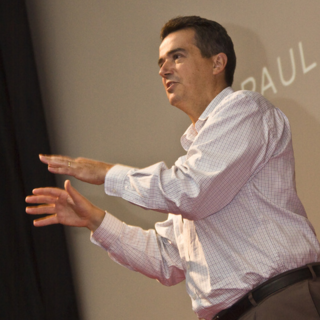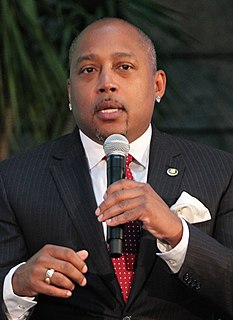Top 1200 Business Strategy Quotes & Sayings - Page 5
Explore popular Business Strategy quotes.
Last updated on November 15, 2024.
If sustainability is going to take hold in the corporate sector in a big way - and we need it to - it will be when it produces big profits and faster growth. It won't happen because of an optional executive commitment to an abstract concept. It will happen because sustainability is a great business strategy. And it is
It should be the aim of grand strategy to discover and pierce the Achilles' heel of the opposing government's power to make war. Strategy, in turn, should seek to penetrate a joint in the harness of the opposing forces. To apply one's strength where the opponent is strong weakens oneself disproportionately to the effect attained. To strike with strong effect, one must strike at weakness.
But the U.S. has to be careful. If our strategy depends on Sunnis doing the fighting to clear Mosul and Ramadi - and, as near as I can tell, that is the strategy - then you have to be careful that Sunnis don't perceive the U.S. to be operating arm in arm with Iran or with Iranian-backed Shiite militias that Abadi - Prime Minister Abadi is using in Iraq, so that, in effect, we're fronting for Iran.
People believe that companies have always had strategies, dating back at least to likes of Henry Ford or Andrew Carnegie, maybe to the contractors who built the Pyramids. As it turns out, it was only in the 1960s and 1970s that a new breed of "business intellectuals" began to develop the intellectual framework that allowed companies to look at the three "C's" of any good strategy - namely their costs, customers, and competitors - in an integrated way.
A Democratic strategy firm is trying to help them out. They did a new poll from - it`s a global strategy group. And they did a poll of both base Democrats and swing voting Democrats, trying to determine how to best harness this energy [ of leftist anger]. And maybe more importantly, how to message it.
Somebody asked me 'what's the job of a CEO', and there's a number of things a CEO does. What you mostly do is articulate the vision, develop the strategy, and you gotta hire people to fit the culture. If you do those three things, you basically have a company. And that company will hopefully be successful, if you have the right vision, the right strategy, and good people.
Finally, I decided that the proper strategy was to stare back. Boys do not have a monopoly on the Staring Business, after all. So I looked him over and soon it was a staring contest. After a while the boy smiled, and then finally his blue eyes glanced away. When he looked back at me, I flicked my eyebrows up to say, I win. He shrugged
Unless the distant goals of meaning, greatness, and destiny are addressed, we can't make an intelligent decision about what to do tomorrow morning -- much less set strategy for a company or for a human life. Nothing is more practical than for people to deepen themselves. The more you understand the human condition, the more effective you are as a businessperson. Human depth makes business sense.
I like guys who know how to implement a strategy. The ones who make a fight look easy. But there's no easy fight, even if you win in 30 seconds, that only means you were able to execute your strategy correctly and induced your opponent to make a mistake. Those are the champions. That's why they are the champions.
In business, integrity is just as important as in any of the great public offices... but I believe one of the first and fundamental obligations of competent business leadership is above all to protect the reputation and integrity of the business - to that degree the integrity of the business is the integrity of the leader.
Fear and hope remain the same; therefore the study of the psychology of speculators is as valuable as it ever was. Weapons change, but strategy remains strategy, on the New York Stock Exchange as on the battlefield. I think the clearest summing up of the whole thing was expressed by Thomas F. Woodlock when he declared: “The principles of successful stock speculation are based on the supposition that people will continue in the future to make the mistakes that they have made in the past.”
Many times when people have a vision, they think in terms of a big vision - I want to take my city for Christ. But the problem with many pastors and this type of vision is this: they haven't developed the strategy to fulfill that vision. A pastor preaches a dream or vision to his/her people, they get excited for a week, a month, or a couple of months, but there is no strategy, planning, or process to fulfill that vision.
I see no other conceivable strategy for the achievement of liberty than political action. Religious or philosophical conversion of each man and woman is simply not going to work; that strategy ignores the problem of power, the fact that millions of people have a vested interest in statism and are not likely to give it up.... Education in liberty is of course vital, but it is not enough; action must also be taken to roll back the State.
When you're in operations, the best thing you can do at the top level is get the strategy right. You have to get the big ideas right, you have to determine what is the policy, what is the level of effort you're willing to commit to it? And then you delegate to those who have to execute that strategy to the appropriate level. What's the appropriate level? It's the level where people are trained and equipped to take decisions so we move swiftly against the enemy.
I see top business schools working to bridge this gap [between academic research and business application] by respecting executive education, by having more mature students who proactively draw from faculty what they know they need, and by having faculty who are willing to leave their ivory towers for the murky world of business reality. Unfortunately, at other times, business professors have little or not interest or savvy about business issues.
If you own a wonderful business...the best thing to do is keep it. All you're going to do is trade your wonderful business for a whole bunch of cash, which isn't as good as the business, and you got the problem of investing in other businesses, and you probably paid a tax in between. So my advice to anybody who owns a wonderful business is keep it.
Give serious thought to why your company should care about your strategy. Specifically, find problems that the board wants to be solved. What are senior managers scared of? Part of becoming a credible strategic thinker is learning effective approaches to selling ideas for your situation. You’ll know that you’re getting better at selling (or pitching) strategy when managers start coming to you when there is strategic thinking to be done.
But what we know, we who are either observers of a business we once were in and loved, or are people within it now, our business as a whole, when it is not obsessed with the business of business, is eaten up with a form of cultural conservatism which is truly amazing. Indeed, more often than not it is eaten up with pure reactionary-ism.
One of the problems many leaders report is a gap between strategy and execution. Usually this "gap" arises because the so-called "strategy" is a set of financial performance goals, not an approach to overcoming challenges. The two key ways to narrow this gap are to avoid bad strategies that fail to explain how to proceed and to establish a proximate objective - something which can be accomplished and which will open the door to further progress.
I can find only three kinds of business in the universe: mine, yours and God's. Much of our stress comes from mentally living out of our business. When I think, "You need to get a job, I want you to be happy, you should be on time, you need to take better care of yourself," I am in your business. When I'm worried about earthquakes, floods, war, or when I will die, I am in God's business. If I am mentally in your business or in God's business, the effect is separation.
None of this means, however, that a business or stock is an intelligent purchase simply because it is unpopular; a contrarian approach is just as foolish as a follow-the-crowd strategy. What's required is thinking rather than polling. Unfortunately, Bertrand Russell's observation about life in general applies with unusual force in the financial world: "Most men would rather die than think. Many do."
I basically see two reasons for a going public: Glencore gets access to more money. It is a way of funding your business and to finance growth. Plus: You have more liquid shares. It is easier to leave the company and redeem your shares. The 'going public' may also be an exit strategy for the top management.
A good strategy focuses efforts on a target, and that focus can only be achieved by not diffusing energy in other directions - that is the meaning of Michael Porter's dictum of "choosing what not to do." At the same time, a good strategy chooses the right target to focus on, not wasting the focus of energy on a target that cannot be affected or that is unimportant - that is the meaning of Drucker's distinction between efficiency and effectiveness.
Strategy is a system of makeshifts. Is is more than a science. It is bringing knowledge to bear on practical life, the further elaboration of an original guiding idea under constantly changing circumstances. It is the art of acting under the pressure of the most demanding conditions...That is why general principles, rules derived from them, and systems based on these rules cannot possibly have any value for strategy.






















































